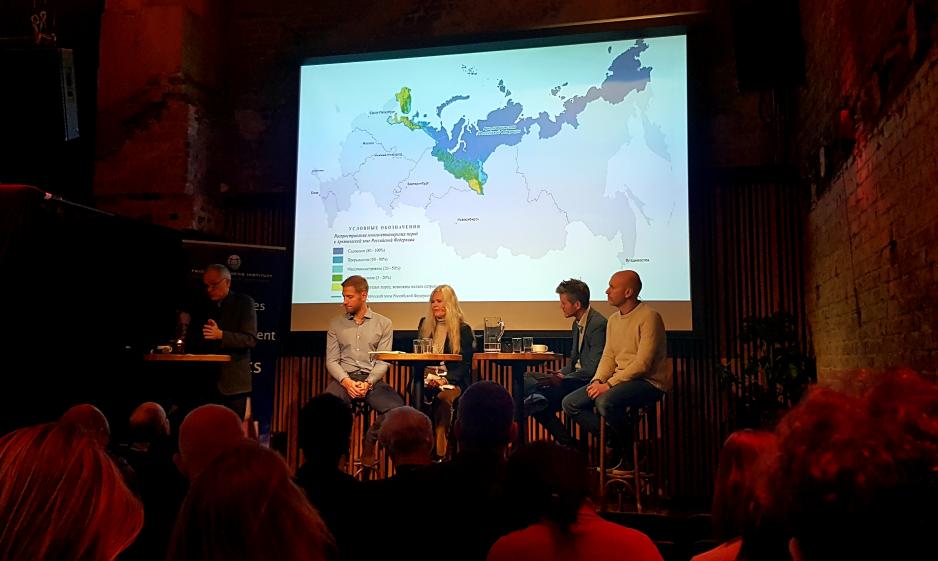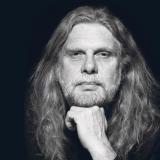The High North as Seen From an Old Courtyard in Oslo

This is what it looks like when the Fridtjof Nansen Institute (FNI) invites to a debate about the High North in an old Oslo courtyard. From the left; Arild Moe, Andreas Østhagen, Gørild Heggelund, Andreas Raspotnik and Svein Vigeland Rottem. Photo: Arne O. Holm
- The High North is changing. It has to do with both climate and military armament. However, it is important that the debate about this is based on facts. These are the words of Norway’s Senior Arctic Official Bård Ivar Svendsen, and were uttered during a debate about the Arctic in an old courtyard in Oslo Thursday morning.
Before that, I had meandered my way through the morning traffic in Oslo chasing the Arctic. The weather was to some extent more polar than the never-ending rain showers that have threatened our own High North with floods for weeks on end, but other than that, there were few – if any – traces of Norway as an Arctic nation.
Blue, green and yellow
On my walk I wandered past Stortinget, the Norwegian parliament, where yellow, blue and green parties are popping cabinet member candidates at a high rate these days. At the same time, a headline of Norwegian daily Aftenposten speaks of northern mayors who argue that it is more important to have northerners included in the government than arguing about what party they come from.
It is a fascinating statement, and one warranting the same as the SAO quote mentioned in introduction. Actual knowledge often trumps political affiliation and is decisive for a debate about what goes on in the Arctic.
That is the reason why a solid panel of scientists are gathered before a crowd at the innermost and uppermost section of an Oslo courtyard on a Thursday morning in January, all with a joint intent of discussing “Big politics in the High North”, with the subtitle “Norway between cold fronts”.
Void of self-absorption
I do not have to go to Oslo to find this kind of debate, however, the fact that the debate takes place in a courtyard in the capital no doubt contributes to the accumulated national competence about the Arctic. In some ways this is even liberating, as the debate is void of all forms of local self-absorption that often characterizes North Norwegian opinion carriers. Their views and reasonings often end up as a light rewriting of their respective postal codes, while the knowledge that exist outside the region about our own region is accused of having elitist motives.
This time, the Fridtjof Nansen Institute had gathered some of its High North competences to a broad debate about international challenges in the Arctic. Some of the researchers also hold positions at the High North Center for Business and Governance at Nord University, and in this way contribute to reinforcing and broadening interdisciplinary cooperation irrespective of geography.
Big politics in the Arctic, like Andreas Østhagen said in the debate, has changed primarily because the USA is dramatically changed since Donald Trump assumed power. Suffice to mention the American aversion against mentioning climate in the Arctic conversation. The fact that the USA also requires security policy issues to be brought on the table in one of the most well-functioning cooperation forums in the High North; the Arctic Council, is another symptom of change.
Big politics in the Arctic has changed primarily because the USA is dramatically changed since Donald Trump assumed power.
A new situation
These challenges, in turn, trigger a question about what role Norway can and should play in international politics in the High North. Our own desire to have American forces on Norwegian soil was developed in a time when the USA’s international role was quite different from what it is today. A very aggressive American foreign policy, in the Arctic too, is part of the bargain when we bless military cooperation on Norwegian soil.
Because in the next step, our freedom to act in the Arctic depends on our relationship with Russia, and then on Chinese interest in the Arctic, and lastly; on the EU – where we do not have a seat at the table, yet are nevertheless heavily involved.
The total sum of these actors’ interests in the Arctic were at the heart of the debate in the courtyard bordering on Youngstorget square in Oslo.
Need re-educating
A recurring tone in any debate about the Arctic is the lack of knowledge from some of the actors. Andreas Raspotnik, who was also on the debate panel, reiterated the impression of an EU that on the one hand is not much concerned with the Arctic, yet on the other hand shapes a rather sharpened policy towards us who reside here.
- European politicians need re-educating, time and again, Raspotnik said.
And he is right. That is why working to reinforce the social science communities in the High North is a good idea. In cooperation with national and international research institutions, this will mean increased knowledge about us who live here.
In the same way as having more North Norwegians in the government, regardless of party affiliations, will contribute to increasing the level of knowledge in the government.
This op-ed was originally published in Norwegian and has been translated by HNN's Elisabeth Bergquist.

